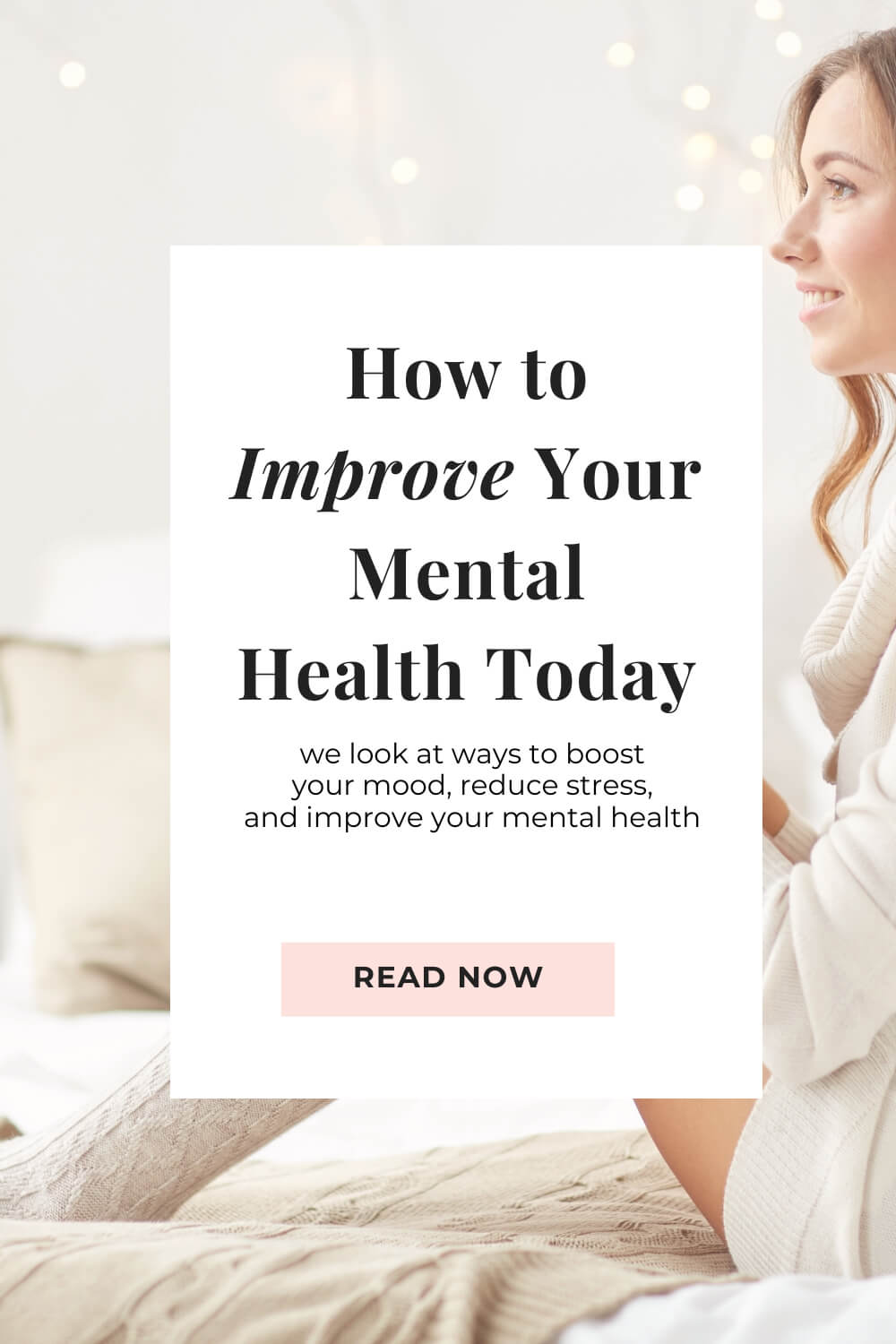Let’s face it: we’re often so caught up in the whirlwind of life that we forget to tend to our most precious asset – our minds. Your mental health shapes everything from your thoughts and feelings to how you tackle life’s curveballs. It’s not just about avoiding breakdowns; it’s about thriving, building resilient relationships, and living a life that makes you want to jump out of bed each morning.
Taking care of and improving your mental health is vital and involves prioritizing activities like exercise, sleep, and healthy eating. It also includes seeking support when you need it. Taking care of your mental health is part of keeping fit and healthy – just like your physical health.
Think of your mental health as a garden. Just as you’d water your plants and pull out weeds, your mind needs regular care to flourish. It’s not a one-and-done deal, but a lifelong journey of nurturing and growth. And the best part? You don’t need a degree in psychology to get started. Simple, everyday actions can make a world of difference.
Are you looking for ways to boost your mood, reduce stress, and improve your mental health? There are many things you can do to be sure that you keep yourself mentally healthy. Here is a list of 11 things you can try to improve your mental health today.
1. Talk to Someone About Your Feelings
Ever felt like you’re carrying the weight of the world on your shoulders? Well, it’s time to lighten the load. Talking about your feelings isn’t a sign of weakness; it’s a superpower. It’s like uncorking a bottle of champagne – all that pent-up pressure finally gets released, and boy, does it feel good!
Opening up doesn’t always mean spilling your guts to the first person you see. It’s about finding your tribe – those people who get you, who’ll listen without judgment, and maybe even offer a fresh perspective. It could be a friend, a family member, or even a therapist. The key is to find someone who makes you feel safe and heard.
Not feeling ready for a face-to-face heart-to-heart? No problem! Grab a journal and let your thoughts flow onto paper. Think of it as having a conversation with yourself, minus the awkward silence. Plus, you might be surprised at the insights you uncover when you see your written thoughts.
Remember, bottling up your emotions is like trying to hold back a tidal wave – sooner or later, something’s gotta give. So why not take control and choose when and how to let it out? Trust me, your future self will thank you for it.
2. Ask for Help When You Need It
Asking for help doesn’t mean you’re weak or incapable. In fact, it’s quite the opposite. It takes guts to admit you aren’t able to cope.
But here’s the tricky part: sometimes we don’t even know what kind of help we need. And that’s okay! The first step is just reaching out. It could be as simple as telling a friend, “Hey, I’m not feeling great, and I’m not sure why.” That’s already a huge leap in the right direction.
Who You Can Ask For Help
Now, who can you turn to? There are more options than you might think:
- Family and friends: They’re your personal cheerleading squad. Don’t underestimate the power of a good chat over a cup of coffee.
- Doctors and mental health professionals: These folks have dedicated their lives to helping people like you. They’ve got tools and strategies up their sleeves that you might not even know exist.
- Support groups: There’s something incredibly powerful about connecting with people who’ve walked in your shoes.
- Hotlines: When you need immediate support, there are lifelines that are available 24/7. Remember, it’s not just for crisis situations – they’re there to listen, whatever you’re going through.
Contacting a Hotline for Immediate Help
The National Suicide Prevention Lifeline isn’t just for suicide prevention – they’re there for any kind of emotional distress.
You can call this crisis hotline at 1-800-273-TALK (8255); En Español 1-888-628-9454. This Lifeline is toll-free, confidential, and available 24 hours a day, seven days a week. You will be connected to your nearest Lifeline national network crisis center. You will have access to counseling and mental health referrals from these centers. The Lifeline can be contacted via TTY at 1-800-799-4889 for people who are deaf, hard of hearing, or have hearing loss.
And if picking up the phone and speaking to a stranger feels dauntinbyg, they even offer an online chat option.
If you or someone you know is in a potentially life-threatening situation, call 911 for immediate emergency assistance, available 24 hours a day, seven days a week, or go to the nearest emergency room immediately.
You can find a list of helplines, support groups, and other resources on our list of mental health resources.
3. Avoid Drinking Alcohol and Using Drugs
Let’s have a real talk about alcohol and drugs. Sure, they might seem like a quick fix when life gets tough, but here’s the cold, hard truth – they’re more like a ticking time bomb for your mental health.
Think of it this way: using substances to cope with stress is like putting a band-aid on a broken leg. It might cover up the problem temporarily, but it’s not fixing anything. In fact, it’s probably making things worse in the long run.
The Negative Impacts of Alcohol and Drug Abuse
Here’s what’s really going down when you turn to these substances:
- Your brain gets rewired: Long-term use can actually change how your brain functions, leading to anxiety, depression, and a whole host of other mental health issues.
- It’s a vicious cycle: You might feel better momentarily, but when the effects wear off, you’re right back where you started – often feeling even worse.
- It’s a relationship wrecker: Substance abuse doesn’t just affect you; it can strain relationships with friends, family, and loved ones.
Alcohol or drug addiction can take a heavy toll on you and the ones around you. There are hotlines available to individuals who are struggling with the abuse of various drugs and alcohol. They are staffed by trained advisors, available at any time, some of whom are also in recovery themselves ready to help you.
Contacting a Hotline for Immediate Help
American Addiction Centers offer toll-free and confidential guidance to those who are struggling with addiction. You can call their hotline on (928) 900-2021. This hotline is anonymous and available 24/7.
You can call the Al-Anon and Ala-teen toll-free hotline line on 800-356-9996. Counselors are available 24/7 to provide support to teens and adults who are negatively impacted by alcohol addiction.
The Substance Abuse and Mental Health Services Administration (SAMHSA) can be reached at 1-800-662-4357 toll-free where English and Spanish-speaking counselors are available 24/7 and will provide referrals to treatment facilities, support groups, and community-based services.
Another hotline is the Poison Control emergency line which you can call on 1-800-222-1222. This line is confidential, toll-free, and available 24/7 to talk to a poisoning control and prevention expert.
If you or someone you know is experiencing a life-threatening crisis such as an overdose, call 911 for immediate emergency assistance, available 24 hours a day, seven days a week, or go to the nearest emergency room immediately.
You can find a list of helplines, support groups, and other resources on our list of mental health resources.
4. Be Physically Active
Exercise plays an important part in your mental health. It makes your body healthier but it also improves your mental health by lowering anxiety, depression, and negative feelings. Improved energy, sleep quality, self-esteem, and overall mood are more benefits of exercise.
Did you know that just 15 minutes of running or an hour of walking can slash your risk of major depression by 26%? That’s right, according to a study by the Harvard T.H. Chan School of Public Health.
Physical activity is simply about getting your body moving and your heart pumping. You don’t need to go to a gym, use special equipment, or wear specific clothing to be able to exercise.
Some activities that you don’t need a gym for to exercise can include:
- Dancing like nobody’s watching in your living room
- Taking the stairs instead of the elevator
- Walking the dog (or borrowing a neighbor’s if you don’t have one)
- Doing some gentle stretches while watching your favorite show
The secret is to find something you enjoy. If you hate running, don’t run! Try swimming, cycling, or even hula hooping. The options are endless, and the only rule is to have fun with it.
The problem with not being physically active is that it can lead to mental health problems and not getting enough exercise can cause dementia and depression, according to the British Nutrition Foundation.
Remember what Dr. Sharp said: “Exercise is the most potent and underutilized antidepressant… and it’s free!” So why not cash in on this free mental health boost? Your mind (and your body) will thank you for it.
5. Practice Gratitude
Being grateful is not a simple act of just saying thank you, being polite, or having courtesy. It’s about genuinely expressing your gratitude for someone or something. It’s a superpower that’s available to everyone but often overlooked.
Now, I know what you’re thinking. “Gratitude? Isn’t that just saying thank you?” Well, in short, no.
Practicing gratitude is like putting on a pair of rose-tinted glasses, but instead of distorting reality, it helps you see the good that’s already there. It’s about actively acknowledging the positive things in your life, big and small. And the best part? It’s a skill you can develop and strengthen over time.
Ways to Practice Gratitude
There are many ways that you can practice gratitude. Here are a few:
- Keep a gratitude journal: Take five minutes each day to jot down three things you’re grateful for. It could be as simple as “the sun was shining today” or as profound as “I had a heart-to-heart with my best friend.”
- Express appreciation: Next time someone does something nice for you, really let them know how much it means to you. Especially the things you usually take for granted.
- Turn challenges into opportunities: Instead of cursing that flat tire, be grateful for the chance to prove to yourself that you can handle unexpected setbacks.
- Become involved in a cause you care about: You can help them by donating your money or time.
- Practice mindfulness: Take a moment to really savor that first sip of coffee in the morning or the feeling of warm sunshine on your face.
Benefits of Practicing Gratitude
Practicing gratitude is known not only to benefit us emotionally but also physically, psychologically, and socially.
Physical benefits
- Lowers your blood pressure
- Boosts your immune system
- Improves quality of sleep
- Increases your desire to exercise more often
Psychological benefits
- Improves your self-esteem
- Increases feelings of optimism and happiness
- Enhances empathy and reduces aggression
- Helps you better cope with stress
- Increases overall self-satisfaction
Social benefits
- Lesser feelings of loneliness and isolation
- Desire to create new relationships
- Feeling more compassionate and generous towards others
- Feeling more outgoing
6. Eat Well
Making healthy food choices is just as important for our mental well-being as it is for our physical health. Your brain is like a high-performance sports car, and what you put in the tank matters. Choosing the right food to fuel your brain is important for you to thrive mentally and emotionally.
Now, I’m not saying you need to overhaul your entire diet overnight. But making a few smart choices can make a world of difference to your mental health. Think of it as tuning up your brain’s engine for optimal performance.
Foods That Will Benefit Your Mental Health
- Whole foods: Fruits and veggies are like nature’s multivitamins. They’re packed with nutrients that your brain loves.
- Antioxidants: Berries, leafy greens, salmon, and chia seeds are like bodyguards for your brain cells, protecting them from damage.
- Fiber-rich food such as fruits and vegetables and nutrient-filled carbs like beans and whole grains. These aren’t just good for your gut – they’re great for your mood too!
- Magnesium: Dark chocolate, cacao nibs, almonds, and cashews. Dark leafy greens like spinach along with bananas and beans are also good sources of magnesium. This mineral can help ease anxiety and improve sleep.
- Vitamin D: This vitamin is absorbed into our bodies from natural sunlight and increases the production of serotonin. You can also take supplements or eat mushrooms that contain Vitamin D.
- Folate: Leafy greens, lentils, and cantaloupes are rich in this B vitamin that helps produce feel-good chemicals in your brain.
- Fermented foods: Sauerkraut, kimchi, miso, tempeh, and the fermented drink kombucha are great for your gut-brain connection.
Cooking a meal from scratch can be a form of mindfulness. It’s a chance to slow down, focus on the present moment, and nourish your body and soul.
Balance is key. You don’t have to swear off your favorite treats forever. It’s about making informed choices most of the time, so you can truly enjoy those special indulgences when they come along.
So, next time you’re at the grocery store, why not throw some brain-boosting foods in your cart? Your mind (and your taste buds) will thank you for it!
7. Quiet Your Mind
In response to the chaos life throws at us, we just keep on pushing through. We try to stay on top of things by to get on with life but eventually we burn out – our productivity drained, and we become exhausted. Quieting your mind helps in reducing stress and improves productivity.
Think of your mind like a snow globe. When life shakes things up, all those thoughts and worries start swirling around, making it hard to see clearly. Quieting your mind is like letting all those snowflakes settle, so you can see the beautiful scene inside.
5 Ways to Quiet Your Mind
- Start your day right: Before you reach for your phone (I know, it’s tempting!), take a moment to be mindful and set the tone for your day. Set your goals to stay on track for what you wish to accomplish that day.
- Breathe. Sounds simple, right? Breathing, something that we take for granted, is a powerful way of regulating our emotions. Click here for breathing exercises for relaxation.
- Progressive muscle relaxation: Relax your muscles by doing progressive relaxation exercises or maybe by getting a massage. Yoga is also great for stretching and relaxing the muscles.
- Exercise: Sometimes a physical release of your stress can help relax your mind. This is because Cortisol, your stress hormone is reduced in your body when you exercise. Then your happy feel-good endorphins, dopamine, and serotonin are released which can improve your mood and quality of sleep.
- Listen to music: Listening to your favorite song or music, especially slow, quiet classical music, can be an extremely effective stress management tool.
Quieting your mind isn’t about having no thoughts at all – that’s pretty much impossible unless you’re a zen master (and even they have thoughts!). It’s about learning to observe your thoughts without getting caught up in them. It’s about creating a little space between you and the constant chatter in your head.
And here’s the best part: the more you practice, the easier it gets. It’s like building a muscle. At first, it might feel awkward or difficult, but stick with it. Before you know it, you’ll be finding pockets of calm even in the midst of chaos.
8. Socialize
Seize every opportunity you have to give your friends and the people that are close to you more time and make your bond with them stronger. Having close connections with your family and friends helps to boost your self-esteem and you will have someone who can provide support when you’re not feeling your best.
We humans are wired for connection. It’s in our DNA. We tend to function better when we are in a social group or community. We realize we are not alone and feel valued when we have people in our lives who share the same interests, values, and outlook on the world as we do.
We feel better about ourselves when we are a part of a social group and it helps us manage tough experiences and emotions.
Staying socially connected with others keeps loneliness at bay, and improves your memory, and cognitive abilities. It also boosts feelings of joy and overall wellness and contributes to a longer life. There is research that shows that maintaining an active social life might lower the risk of developing dementia.
There are so many activities that you can do to socialize with your family and friends. How about considering one of the following options for your next social gathering?
- Organize a game night: Nothing brings people together like a little friendly competition. How about the one of the greatest boardgames ever? Monopoly!
- Meet for coffee: Sometimes, a simple chat over a warm drink can work wonders.
- Movie night: Pop some corn, pick a flick, and enjoy some shared laughs (or tears).
- Volunteer together: Doing good feels good, and it’s even better when shared.
- Get outdoors: A hike or a picnic in the park can be a great way to connect.
If in-person meetups aren’t always possible, technology has got your back.
Just like when Covid-19 took over the world, many in-person social activities were canceled, but that’s when people got creative and found alternative ways to connect and interact with one another.
Many of the things we used to do in person can also be done virtually, such as:
- Trivia nights
- Meditation sessions
- Yoga and other fitness classes
- Support groups
- Book club
- Birthdays, funerals, and weddings
- Cooking and art lessons
You can also set up a simple video call with friends and loved ones in the safety of your own home via Zoom or Skype. Or you could even have a Teleparty or a Facebook Watch Party.
Building and maintaining social connections takes effort, but it’s worth it. It’s an investment in your mental health that pays dividends for years to come. So go ahead, reach out to that friend you’ve been meaning to call.
9. Get Enough Sleep
Ever heard the phrase “woke up on the wrong side of the bed”? Well, there’s more truth to it than you might think. Sleep isn’t just about giving your body a break – it’s like hitting the reset button for your brain.
Think about it: when you’re sleep-deprived, everything feels harder. You’re crankier than a toddler who missed nap time, your concentration goes out the window, and stress feels like it’s dialed up to eleven. It’s like trying to run a marathon in flip-flops – technically possible, but why make life harder for yourself?
You can turn your bad sleeping habits into good ones with some simple tweaks:
- Stick to a sleep schedule: Your body loves routine. Try to hit the hay and wake up at the same time every day, even on weekends. It’s like training your internal clock.e
- Create a bedtime ritual: Maybe it’s a warm bath, some light stretching, or curling up with a good book. Find what helps you unwind and make it a nightly habit.
- Upgrade your sleep setup: Invest in a comfy mattress and pillows. It’s like giving yourself a first-class ticket to Dreamland.
- Try a weighted blanket: It’s like a warm hug for your whole body. Who doesn’t want that?
- Get moving during the day: Regular exercise can help you fall asleep faster and enjoy deeper sleep. Just don’t do it too close to bedtime, or you might be too amped up to snooze.
- Soak up some rays: Aim for 10 to 30 minutes of sunlight several times a week. It helps regulate your body’s sleep-wake cycle. Can’t get outside? A Vitamin D supplement might do the trick.
- Ditch the screens: The blue light from your devices is like caffeine for your brain. Try to unplug at least an hour before bed.
- Sleep in darkness: Keep your bedroom dark and quiet. If you live in a noisy area, consider a white noise machine or earplugs.
- Skip the nightcap: Alcohol might make you feel sleepy at first, but it can disrupt your sleep later in the night. The same goes for caffeine and tobacco.
10. Care About Yourself
Something that might sound a bit indulgent but is actually crucial for your mental health: self-care. Self-care means understanding the things you need and want and making sure you give them to yourself. It’s important to make sure that you take care of your mind, body, and soul every single day, and not only when you’re not feeling good.
Practicing self-care daily can help you stay healthy, happy, and resilient.
It isn’t easy… We’re so caught up in our busy and stressful jobs, as well as other things we need to do or pay attention to, that we forget to look after ourselves.
Self-care doesn’t have to be costly or involve drastic life changes. Tasks as simple as taking a shower, drinking a glass of water, or remembering to eat well and go outside for a while are considered to be acts of self-care.
Here are some ways that you can practice self-care:
- Develop a sleep routine: We’ve already talked about how crucial sleep is. A good night’s sleep can reduce stress and improve your mood the next day. It can also help improve your memory and focus too.
- Exercise regularly: Exercise isn’t just good for your body – it’s a mood booster and stress buster too. Find something you enjoy, whether it’s dancing, hiking, or chasing your dog around the park.
- Prepare and eat a healthy meal: Cooking is a great way to relax and unwind.
- Spend some time outside: Spending time outside isn’t just about getting Vitamin D. It can increase serotonin production in your brain, making you feel happier and more relaxed.
- Read a book. Reading isn’t just entertaining – it can reduce stress, boost empathy, and even help you sleep better.
- Indulge in essential oils. It has been shown that adding a few drops of citrus-scented oil, particularly orange essential oil to a hot bath can soothe away stress and anxiety.
- Meditate. Even just 10 minutes a day can help calm your mind and boost your emotional stability. Can’t sit still? Try a walking meditation or a mindfulness app.
- Learn to say no: Your time and energy are precious resources. It’s okay to protect them. Remember, “No” is a complete sentence.
Self-care isn’t selfish – it’s necessary. It’s like putting on your own oxygen mask before helping others. So go ahead, make yourself a priority.
11. Help Others
Here’s a mental health tip that might surprise you: help others. Yep, you read that right. Turns out, being kind to others is like a boomerang – it comes right back to boost your own well-being.
An article by Mental Health Foundation suggests that acts of kindness and giving to others can help your mental health. Helping other people gives you a feeling of purpose and self-worth, improving your self-esteem.
You don’t need to make grand gestures or any huge commitments. Small acts of kindness can have a big impact. Here are some ideas to get you started:
- Whip up breakfast in bed for your partner. It’s like saying “I love you” with bacon and eggs.
- Read stories to kids at your local library. You’ll be nurturing young minds and rediscovering the joy of “The Cat in the Hat” all at once.
- Join a park clean-up. You’ll be making your community prettier and meeting like-minded people. Double win!
- Hold the elevator door for someone rushing to catch it. Their relieved smile will make your day.
- Pick up the phone and call a friend or loved one. In this age of texts and emails, a voice call can mean a lot to someone.
Helping others isn’t just good for them – it’s good for you too. It can give you a sense of connection and community that’s priceless for your mental health.
So, why not give it a try? Start small. Hold a door open, offer a genuine compliment, or simply smile at a stranger. You might just find that in trying to brighten someone else’s day, you’ve lit up your own.
When to Start Improving Your Mental Health
The best time to start taking care of your mental health was yesterday. The second-best time? Right now!
These 11 tips aren’t just feel-good advice – they’re practical, science-backed strategies for boosting your mental well-being. Whether you’re chatting with a friend, breaking a sweat, or simply taking a moment to appreciate the good stuff in your life, each step you take is a stride towards a healthier, happier you.
So, why wait? Pick one tip that resonates with you and give it a shot today. Maybe it’s taking a walk in nature, calling an old friend, or simply jotting down three things you’re grateful for. Start small, be consistent, and watch how these little changes add up to big improvements in your mental well-being.
Is there a mental health tip you swear by that’s not on the list? Let us know in the comments!
References
- Our best mental health tips – backed by research – Mental Health Foundation
- How to improve your mental wellbeing – Mind
Save This Post for Later
Pin this blog post by saving the image below to Pinterest so you can revisit it whenever you want!

















